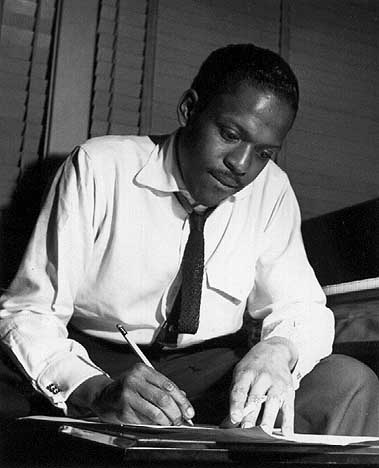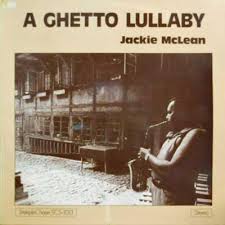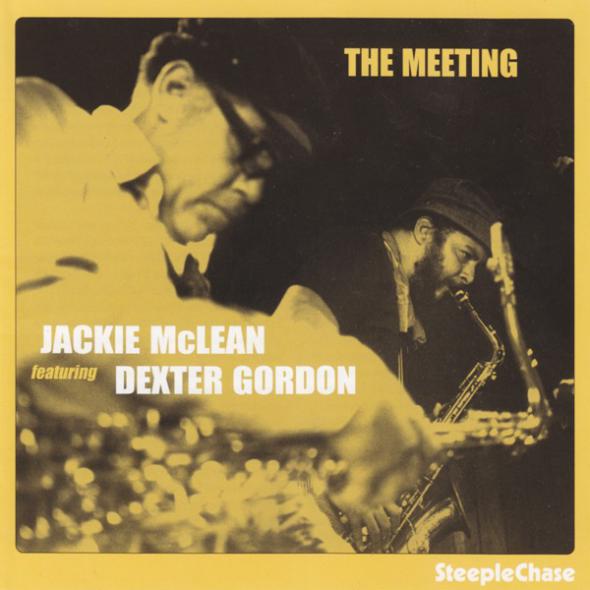Callin' – Kenny Drew, Sr.
A hard-bop swinger with a short form. Two recordings are available from the same week of performances.
- Recording: Jackie McLean - A Ghetto Lullaby
- Recorded on: July 19, 1973
- Label: SteepleChase (SCS 1013)
- Concert Key: F
- Vocal Range: , to
- Style: Swing (medium)
- Alto Sax - Jackie McLean
- Piano - Kenny Drew
- Bass - Niels Henning Orsted Pedersen
- Drums - Alex Riel
0:00
0:00
Buy MP3
Video
- Description
- Historical Notes
- Solos
- Piano Corner
- Bass Corner
- Drum Corner
- Guitar Corner
- Inside & Beyond
- Minus You
This song's 16-measure chord progression is labeled with eight-measure A and B sections, but it can also be considered AABA with four measures in each section. Both in melody and changes, the song explores the "walk up" from the II (G minor) via ♯II (G♯diminished) to the tonic with the III (A) in the bass. In this case, the "walk up" goes one step further, to B♭ minor. By contrast, the bridge contains just one chord every two measures, with a "broken time" feel in the head.
On this quartet version, Jackie McLean interprets the melody rather freely. The melody in the lead sheet is taken from the way Jackie and Dexter Gordon play it together on the other recording (click on the second album cover for more information).
Comparing our audio clips from these two recordings reveals:
Jackie (alone):
-- plays it at a slower tempo
-- plays the melody only once, and at a more relaxed tempo, interpreting the melody more freely
Jackie and Dexter: (our lead sheet editions are taken from this performance)
-- play it faster
-- play the melody twice before solos, and once after solos
-- two horns playing the melody together allows for less individual liberty in interpreting the melody
On this quartet version, Jackie McLean interprets the melody rather freely. The melody in the lead sheet is taken from the way Jackie and Dexter Gordon play it together on the other recording (click on the second album cover for more information).
Comparing our audio clips from these two recordings reveals:
Jackie (alone):
-- plays it at a slower tempo
-- plays the melody only once, and at a more relaxed tempo, interpreting the melody more freely
Jackie and Dexter: (our lead sheet editions are taken from this performance)
-- play it faster
-- play the melody twice before solos, and once after solos
-- two horns playing the melody together allows for less individual liberty in interpreting the melody
Jackie McLean was living in Copenhagen in the early '70s. The two recordings of this song come from separate nights of his week at Jazzhus Montmartre, Copenhagen's leading jazz club, in July 1973. Three albums were made from this one week's concerts; in addition to "A Ghetto Lullaby" with this quartet and "Jackie McLean/Dexter Gordon The Meeting," there is also "Ode to Super" featuring special guest Gary Bartz, with a different rhythm section. The rhythm section featured here was one of the most important house rhythm sections at the club, and you can find them recording together starting in January, 1965, with saxophonist Ben Webster.
Related Songs
Email Send Callin' to a friend
Send this page to a friend via email. Add your name or email in the first field. In the second, add one or more email addresses, separated by a comma.
- Recording: Jackie McLean - The Meeting, vol. 1
- Recorded on: July 21, 1973
- Label: SteepleChase (SCS 1106)
- Concert Key: F
- Vocal Range: , to
- Style: Swing (medium)
- Alto Sax - Jackie McLean
- Tenor Sax - Dexter Gordon
- Piano - Kenny Drew
- Bass - Niels Henning Orsted Pedersen
- Drums - Alex Riel
0:00
0:00
Buy MP3
Video
- Description
- Historical Notes
- Solos
- Piano Corner
- Bass Corner
- Drum Corner
- Guitar Corner
- Inside & Beyond
- Minus You
This version is slightly faster than the quartet recording. The melody on the lead sheet is taken from this version, as are Kenny's piano comping rhythms indicated in the C lead sheet. The in head is played twice; on the quartet recording it is played only once.
Comparing our audio clips from these two recordings reveals:
Jackie (alone):
-- plays it at a slower tempo
-- plays the melody only once, and at a more relaxed tempo, interpreting the melody more freely
Jackie and Dexter: (our lead sheet editions are taken from this performance)
-- play it faster
-- play the melody twice before solos, and once after solos
-- two horns playing the melody together allows for less individual liberty in interpreting the melody
Comparing our audio clips from these two recordings reveals:
Jackie (alone):
-- plays it at a slower tempo
-- plays the melody only once, and at a more relaxed tempo, interpreting the melody more freely
Jackie and Dexter: (our lead sheet editions are taken from this performance)
-- play it faster
-- play the melody twice before solos, and once after solos
-- two horns playing the melody together allows for less individual liberty in interpreting the melody
It's fascinating to hear Jackie and Dexter together; this album is the only recording with the two of them. It is an unlikely combination; the New York-born McLean and the Los Angeles-born Gordon combine their rich, heavy-hitting approaches for a classic hard-bop sound.
Dexter had played extensively with the same rhythm section in Copenhagen in the mid-'60s.
For another Kenny Drew title from the same performance, check out Sunset.
Dexter had played extensively with the same rhythm section in Copenhagen in the mid-'60s.
For another Kenny Drew title from the same performance, check out Sunset.
Related Songs
Email Send Callin' to a friend
Send this page to a friend via email. Add your name or email in the first field. In the second, add one or more email addresses, separated by a comma.

Kenny Drew, Sr.
August 28, 1928 – August 4, 1993
Kenny Drew was born in New York City. He studied classical piano but soon turned to jazz. His recording career started in 1950 at age 22, first with Howard McGhee for Blue Note, then Sonny Stitt for Prestige. These two 1950 recordings plus a surviving radio broadcast with Charlie Parker (December 8, 1950) put him in the company of jazz greats J.J Johnson, Max Roach and Art Blakey. Read more...
There was a problem.
...


